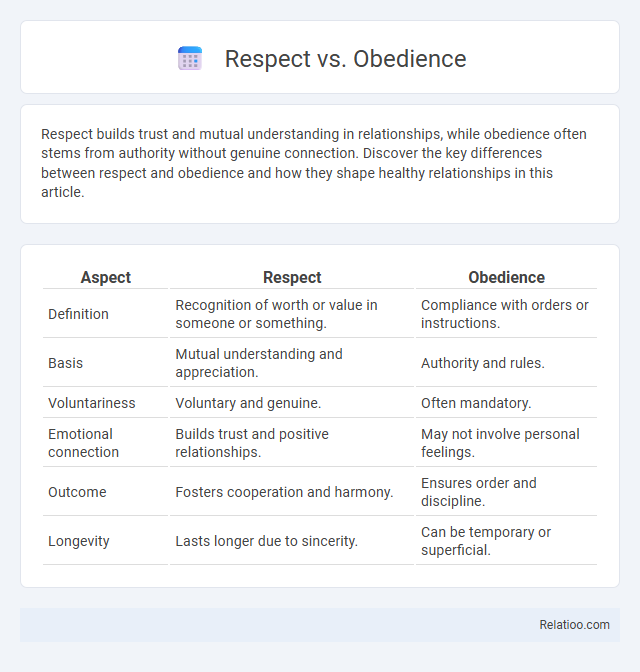Respect builds trust and mutual understanding in relationships, while obedience often stems from authority without genuine connection. Discover the key differences between respect and obedience and how they shape healthy relationships in this article.
Table of Comparison
| Aspect | Respect | Obedience |
|---|---|---|
| Definition | Recognition of worth or value in someone or something. | Compliance with orders or instructions. |
| Basis | Mutual understanding and appreciation. | Authority and rules. |
| Voluntariness | Voluntary and genuine. | Often mandatory. |
| Emotional connection | Builds trust and positive relationships. | May not involve personal feelings. |
| Outcome | Fosters cooperation and harmony. | Ensures order and discipline. |
| Longevity | Lasts longer due to sincerity. | Can be temporary or superficial. |
Understanding Respect: Definition and Importance
Respect involves recognizing the inherent worth and rights of others, fostering positive interpersonal relationships and mutual trust. Unlike obedience, which requires following commands, respect is voluntary and stems from genuine appreciation rather than fear or obligation. Your ability to practice respect enhances communication, collaboration, and social harmony across diverse environments.
Obedience Explained: What It Really Means
Obedience means following instructions or rules set by an authority, often without questioning the rationale behind them. It involves compliance and submission to directives, reflecting a power dynamic where the individual yields to commands. While respect is earned through admiration and consideration involves empathy and thoughtfulness, obedience primarily emphasizes adherence to authority and established guidelines.
Key Differences Between Respect and Obedience
Respect involves recognizing and valuing someone's qualities, opinions, or rights, whereas obedience is the act of following orders or rules without necessarily agreeing with them. Your ability to show respect encourages open communication and mutual understanding, while obedience often hinges on authority and compliance. Consideration integrates both by reflecting attentiveness to others' feelings and needs, enhancing relationships beyond mere following of directives.
The Role of Authority in Shaping Behavior
Authority plays a crucial role in shaping behavior by defining boundaries where respect, obedience, and consideration intersect. Respect involves recognizing the legitimacy of authority and its influence on social norms, while obedience requires compliance with rules or commands often rooted in that authority. Your ability to balance consideration--empathizing with others' perspectives--within these structures ensures healthier relationships and more effective leadership.
Building Respect in Personal and Professional Relationships
Building respect in personal and professional relationships involves recognizing individual boundaries, valuing diverse perspectives, and maintaining consistent honesty. Demonstrating empathy and active listening fosters mutual understanding, which cultivates a foundation of trust and appreciation. Prioritizing respect over mere obedience encourages collaboration, enhances communication, and strengthens long-term connections.
Consequences of Blind Obedience
Blind obedience can lead to detrimental consequences such as the suppression of personal judgment, increased risk of unethical actions, and potential harm to both individuals and society. Respect involves understanding and valuing others' perspectives, while consideration incorporates empathy and thoughtful analysis, preventing the mechanical following of orders. Your awareness of these distinctions promotes ethical decision-making and safeguards against the pitfalls of unquestioning compliance.
When Respect and Obedience Align
Respect and obedience align when authority is exercised ethically and commands reflect shared values, fostering trust and cooperation. In such contexts, individuals willingly comply with directives, perceiving them as fair and legitimate, which strengthens organizational or social harmony. This alignment enhances mutual understanding, reduces conflict, and promotes effective decision-making in hierarchical relationships.
Teaching Children: Fostering Respect Over Obedience
Teaching children to value respect over mere obedience encourages critical thinking and emotional intelligence, fostering healthier relationships and self-confidence. Emphasizing respect involves listening, understanding feelings, and modeling empathy, which shapes Your child's ability to interact positively with others. Prioritizing consideration over blind compliance helps children develop moral judgment essential for lifelong personal and social growth.
Respect vs Obedience in the Workplace
Respect in the workplace fosters genuine trust and encourages open communication, while obedience often results in compliance without engagement or input. Employees who feel respected are more motivated and likely to contribute innovative ideas, whereas obedience alone can stifle creativity and reduce job satisfaction. Balancing respect with necessary obedience creates a productive environment where authority is acknowledged, but individual value is maintained.
Cultivating a Culture of Mutual Respect
Cultivating a culture of mutual respect requires understanding the distinction between respect, obedience, and consideration, emphasizing genuine regard over mere compliance. Your efforts to encourage open communication and empathy foster an environment where individuals feel valued and heard, promoting collaborative relationships. Prioritizing respect strengthens trust and enhances organizational cohesion, leading to sustained positive outcomes.

Infographic: Respect vs Obedience
 relatioo.com
relatioo.com